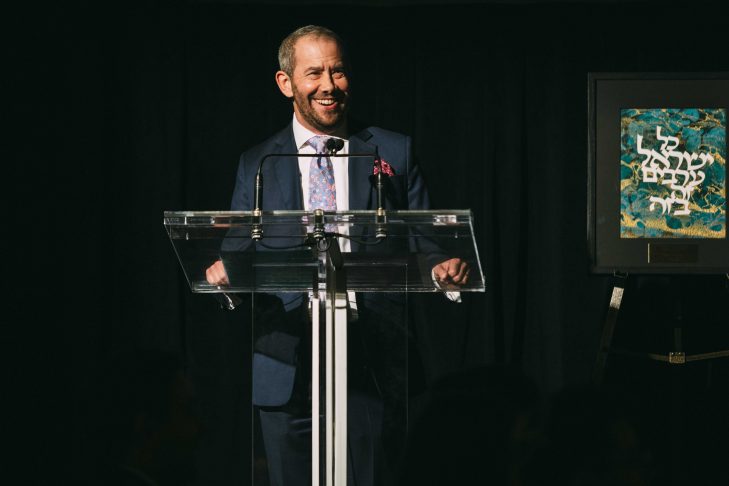Keshet’s new board chair, Seth Marnin, began his three-year term on Jan. 1. A lawyer and employment specialist, Marnin’s involvement with Keshet has been personal and professional. Idit Klein, Keshet’s founder and executive director, praised Marnin’s “extensive experience as a legal strategist, Jewish community leader and LGBTQ rights activist.” Noted Klein, “In a time of escalating threats to LGBTQ rights, I am grateful to have Seth as a thought partner in our work for equality in Jewish life and the broader world.” Marnin recently shared his story and his hopes for Keshet’s future with JewishBoston.
What drew you to Keshet?
I’m an observant Jew and a transgender man, which are two major parts of my identity. It was obvious that I would find my way to Keshet. I was long familiar as well as excited about Keshet’s work. Idit and I had also intersected at various Jewish or LGBTQ events. I also served for almost five years as the vice president for civil rights at the Anti-Defamation League (ADL). I consulted with Idit when filing amicus briefs on marriage equality cases, LGBTQ discrimination cases and other related matters. When Idit asked me to be on Keshet’s board, I didn’t make them ask me three times! It was a natural fit.
What are some of your Jewish influences?
I grew up in Albany, New York. My family attended what could be considered a “Conservadox” synagogue. As an adult, I met Dan Ornstein, the rabbi at Ohav Shalom, a Conservative, progressive synagogue in Albany. In the mid-‘90s Dan started to explore what it would mean to be a gay, lesbian and bisexual inclusive synagogue. He was ahead of the Conservative movement and the Jewish Theological Seminary. I was part of a group of gay and lesbian Jews who participated in conversations at Dan’s synagogue. At that time in my life, I was attending a more traditional minyan. I was a gender non-conforming woman. Depending on who was davening, we sometimes waited for a 10th man to complete a minyan. I eventually moved over to Ohav. I remember a very important moment at Yom Kippur services when Dan gave a drash, or sermon, observing that we were all at Sinai. He wanted Ohav to be a warm and inclusive place for all Jews, including LGBTQ Jews.
What did you pursue after you left the ADL in 2016?
I’ve remained active in the Jewish communal world. The summer of 2016, I watched the political conventions and decided to volunteer on the Clinton campaign. After the election, folks happened to reach out to me about their legal employment issues. I also worked with [philanthropist] Martin Kaminer, who had just begun to identify sexual harassment in the Jewish communal world. At that time, I also reached out to Idit for more information on discrimination issues.
As a consultant, I also had the flexibility to immerse myself in Keshet. I joined the board in 2016 just as the organization began to initiate its strategic plan. Things had changed dramatically in the landscape, and we were considering the future of Keshet post-election. I was involved in internal conversations with partners who engaged with Keshet through synagogue leadership and day school participation. It was interesting to hear what other people thought about Keshet. Overall, people felt quite positive about Keshet’s work. There was also a notable commitment to making sure that the Jewish community was inclusive. I often think of Dan’s words from his 1994 drash—“We were all at Sinai.”
What issues did you tackle as a new board member?
Shortly after I joined the board, exciting things were happening, including a ballot initiative in Massachusetts for transgender rights. Keshet made a significant difference in the outcome of Question 3. We turned out the most canvassers from any other organization in the state. Ballot initiatives are among the reasons LGBTQ issues lose at the ballot box. Folks don’t understand what’s at stake and often the initiatives are worded confusingly. Keshet’s work was instrumental in getting the word out that if you supported trans folks and opposed discrimination, you should vote “Yes on 3.” We educated people on the implications of various votes.
What are your goals during your tenure as board chair?
My primary goal is to be a strong partner to Idit. In the healthiest of organizations, the board chair and CEO have a partnership that is in sync to keep the organization steady. I also see my tenure as a tremendous opportunity to expand Keshet’s work strategically. Keshet has done a tremendous amount of work with synagogues, day schools and camps to make them open and inclusive.
It’s a big country, and some places in America have not had the opportunity to benefit from Keshet’s work. Another important part of Keshet’s work is with LGBTQ teens. Connecting LGBTQ Jewish teens is a life-altering experience for them. They don’t have to check any part of their identity at the door, and they develop leadership skills they can exercise in their home communities. The more young people advocate for themselves and others, the stronger the community becomes.
What do you envision for Keshet’s future?
There are many opportunities to expand Keshet’s advocacy work on behalf of Question 3 in Massachusetts. That campaign was a tremendous example of the power and opportunity Keshet has to leverage relationships and networks in Jewish organizations to advance LGBTQ rights. It’s a real privilege to have this opportunity as board chair to lead with Idit. It’s also an honor to be associated with such an important organization in the Jewish community.



